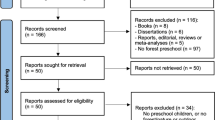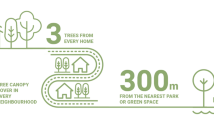Abstract
In many developing countries, children devote substantial time to collecting firewood and fetching water. Is there a connection between such time-consuming work and children’s schooling? If so, environmental degradation may have serious detrimental implications for children’s education. To explore this question, this case study set in rural Tanzania uses evidence collected from children and their mothers about children’s environmental chores. Although the sample is small, we find some descriptive quantitative evidence as well as qualitative evidence from focus groups with children supporting such a link, consistent with the results from the few econometric analyses set in Africa. We also document substantial demands by schools for students to fetch water. The proposed conceptual framework takes into account confounding factors including school-related violence, which affected more than one-third of the children in this study. We make a case for future research based on larger data collection projects designed to explore these issues more fully.
Dans beaucoup de pays en développement, les enfants passent du temps important à chercher du bois et de l’eau. Y a-t-il un lien entre de telles activités prenantes et l’éducation des enfants ? Si c’est le cas, la dégradation environnementale peut avoir des implications graves pour l’éducation des jeunes. Pour explorer cette question, cette étude, effectuée en Tanzanie rurale, se sert d’évidence recueillie directement d’enfants et de leurs mères au sujet de leur travail environnemental. Bien que l’échantillon soit petit, nous y trouvons de l’évidence descriptive et quantitative aussi bien que de l’évidence qualificative ramassée de groupes de discussion d’enfants soutenant un tel lien concordant avec les résultats d’analyses économétriques entreprises en Afrique. Nous décrivons aussi de nombreuses demandes de la part des écoles aux élèves de chercher de l’eau. Le cadre conceptuel proposé tient compte d’éléments confondants tels que la violence à l’école, qui avait touché plus d’un tiers des élèves dans cette étude. Nous présentons des arguments pour de la recherche future basée sur des projets de collection d’information plus importants conçus pour explorer plus profondément ces problèmes.

Similar content being viewed by others
References
Assaad, R. and Levison, D. (2010) The effect of domestic work on children’s schooling: Evidence from Egypt. Feminist Economics 16(1): 79–128.
Biran, A., Abbot, J. and Mace, R. (2004) Families and firewood: A comparative analysis of the costs and benefits of children in firewood collection and use in two rural communities in Sub-Saharan Africa. Human Ecology 32(1): 1–25.
Boone, C., Glick P. and Sahn D.E. (2011) Household water supply choice and time allocated to water collection: Evidence from Madagascar. Journal of Development Studies 47(12): 1826–1850.
Burke, K. and Beegle, K. (2004) Why children aren’t attending school: The case of Northwestern Tanzania. Journal of African Economies 13(2): 333–355.
Cooke, P.A. (1998) Intrahousehold labor allocation responses to environmental good scarcity: A case study from the Hills of Nepal. Economic Development and Cultural Change 46(4): 807–830.
Dammert, A.C. and Galdo, J. (2013) Child labor variation by type of respondent: Evidence from a large-scale study. World Development 51(11): 207–220.
DeGraff, D.S. and Bilsborrow, R.E. (2003) Children’s school enrollment and time at work in the Philippines. Journal of Developing Areas 37(1): 127–158.
Dillon, A. (2010) Measuring child labor: Comparisons between hours data and subjective measures. In: R.K.Q. Akee, E.V. Edmonds and K. Tatsiramos (eds.) Research in Labor Economics, Vol. 31. UK: Emerald Books, pp. 135–159.
Dillon, A., Bardasi, E., Beegle, K. and Serneels, P. (2012) Explaining variation in child labor statistics. Journal of Development Economics 98(1): 136–147.
Edmonds, E.V. (2007) Chapter 57: Child labor. In: T.P. Schultz and J.A. Strauss (eds.) Handbook of Development Economics, Vol. 4. North-Holland: Elsevier, pp. 3607–3709.
Falkenmark, M. and Widstrand, C. (1992) Population and water resources: A delicate Balance. Population Bulletin 47(3): 1–36.
Gebru, B. and Bezu, S. (2014) Environmental resources collection: Implications for children’s schooling in Tigray, Northern Ethiopia. Environment and Development Economics 19(2): 182–200.
Gibson, William and Andrew Brown. 2009. Working with Qualitative Data. London: SAGE Publications.
Glewwe, P., Hanuschek, E.A., Humpage, S. and Ravina, R. (2014) Chapter 2: School resources and educational outcomes in developing countries: A review of the literature from 1990 to 2010. In P. Glewwe (ed.) Education Policy in Developing Countries. Chicago: University of Chicago Press.
Harber, C. (2004) Schooling as Violence: How Schools Harm Pupils and Societies. New York: RoutledgeFalmer.
Harvey, P.A. and Reed, R.A. (2006) Sustainable supply chains for rural water supplies in Africa. Engineering Sustainability 159(1): 31–39.
Koissy-Kpein, S. (2012) Gender and competition between economic or non-economic labor and schooling: Evidence from EPAM Mali. African Development Review 24(1): 107–123.
Kondylis, F. and Manacorda, M. (2012) School proximity and child labor: Evidence from rural Tanzania. Journal of Human Resources 47(1): 32–63.
Koolwal, G. and van de Walle, D. (2013) Access to water, women’s work, and child outcomes. Economic Development and Cultural Change 61(2): 369–405.
Lancy, D.F. (2015) The Anthropology of Childhood: Cherubs, Chattel, Changelings. Cambridge: Cambridge University Press.
Lyon, S., Ranzani M. and Rosati, F.C. (2013) Unpaid Household Service and Child Labor. Understanding Children’s Work Project Working Paper, Rome.
Lihwa, F., Johnstone, C., Thomas, M. and Krause, B. (2015) How Near is Your School? Informing NGO Programming through Children’s Perceptions of Distance. Manuscript.
Marks, S. (2013) Applied Research for Improved Global Health: Linking Engineering to Water Policy and Practice. presentation.
Nankhuni, F.J. (2004) Environmental Degradation, Resource Scarcity and Children’s Welfare in Malawi: School Attendance, School Progress and Children’s Health. PhD Dissertation, The Pennsylvania State University.
Nankhuni, F.J. and Findeis, J.L. (2004) Natural resource-collection work and children’s schooling in Malawi. Agricultural Economics 31(2–3): 123–134.
Ndiritu, S.W. and Nyangena, W. (2011) Environmental goods collection and children’s schooling: Evidence from Kenya. Regional Environmental Change 11(3): 531–542.
Orkin, K. (2011) ‘See first, think later, then test’: How children’s perspectives can improve economic research. European Journal of Development Research 23(5): 774–91.
Reynolds, P. (1991) Dance Civet Cat: Child Labour in the Zambezi Valley. Athens: Ohio University Press.
Rogers, M. (2014) Chapter 3: Forest Access and Human Capital Accumulation. In Environment and Development: Essays on the Link between Household Welfare and the Environment in Developing Countries. PhD Dissertation, University of Minnesota.
Tafere, Y. and Pankhurst, A. (2015) Chapter 5: Children combining work and school in Ethiopian Communities. In A. Pankhurst, M. Bourdillon and G. Crivello (eds.) Children’s Work and Labour in East Africa: Social Context and Implications for Policy. Addis Ababa: OSSREA.
United Republic of Tanzania. (2009) Poverty and Human Development Report. Dar-es-Salaam, Tanzania: MKUKUTA Secretariat, Poverty Eradication Division, Ministry of Planning, Economy and Empowerment.
Vavrus, F. (2003) Desire and Decline: Schooling Amid Crisis in Tanzania. New York: Peter Lang.
Webbink, E., Smits, J. and De Jong, E. (2012) Hidden child labor: Determinants of housework and family business work of children in 16 developing countries. World Development 40(3): 631–642.
Woodhead, M. (2004) Psychosocial impacts of child work: A framework for research, monitoring and intervention. International Journal of Children’s Rights 12(4): 321–377.
Acknowledgements
Funding from the University of Minnesota (International Collaborative Seed Grant, Office of International Programs, 2010) made data collection possible. We acknowledge NIH Center Grant R24HD041023 for support from the Minnesota Population Center. We are grateful to Savannahs Forever Tanzania, its Director Susan James, and an excellent field team including Edward Sandet, Fenela Msangi, Gloria Mollel, Felix Shayo, David Mollel, Gerald Mollel and Majory Kaziya Silisyene; research assistance from Harshada Karnik is also appreciated. Thanks for comments from Nicholas Nagle, participants at the Humphrey School’s Global Policy seminar, and especially Michael Bourdillon.
Author information
Authors and Affiliations
Corresponding author
Rights and permissions
About this article
Cite this article
Levison, D., DeGraff, D.S. & Dungumaro, E.W. Implications of Environmental Chores for Schooling: Children’s Time Fetching Water and Firewood in Tanzania. Eur J Dev Res 30, 217–234 (2018). https://doi.org/10.1057/s41287-017-0079-2
Published:
Issue Date:
DOI: https://doi.org/10.1057/s41287-017-0079-2




